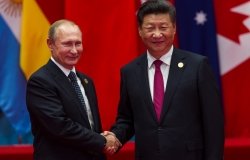Korean Endgame
In a seminar jointly hosted by three Wilson Center programs – the Asia Program, the Nonproliferation Forum, and the Conflict Prevention Project – Selig S. Harrison, Senior Scholar at the Center, spoke about his new book KOREAN ENDGAME: A Strategy for Reunification and U.S. Disengagement, published earlier this year by Princeton University Press.
Overview
Speaker
Selig S. Harrison, Director, Asia Program, Center for International Policy, and Senior Scholar, Wilson Center;
Commentators
Robert J. Einhorn, senior advisor, Center for Strategic and International Studies;
Nicholas Eberstadt, Henry Wendt Chair in Political Economy, American Enterprise Institute
In a seminar jointly hosted by three Wilson Center programs – the Asia Program, the Nonproliferation Forum, and the Conflict Prevention Project – Selig S. Harrison, Senior Scholar at the Center, spoke about his new book KOREAN ENDGAME: A Strategy for Reunification and U.S. Disengagement, published earlier this year by Princeton University Press.
Harrison offered two main arguments in his opening presentation. First, the North Korea policy of the Bush administration increases the danger that Pyongyang will develop nuclear weapons and nuclear-capable long-range missiles. Second, it is possible for the United States to negotiate a stable peace with North Korea. Indeed, Washington should be able, at a relatively low price, to persuade Pyongyang to halt its missile exports and its development of long-range missiles. Getting North Korea to give up its nuclear option and to pull back its forward-deployed conventional forces, however, will require a far higher price. Harrison's new book, based on more than thirty years of reporting on Asian security issues as well as seven trips to North Korea, focuses on just what that price would have to be.
Harrison contended that the Bush administration's approach to North Korea has been a failure because the administration has been unwilling to give the North anything significant in return for the major North Korean concessions Washington seeks. While conceding that many feel it is repugnant to buy off this regime, Harrison maintained that the price for not doing so is high. If North Korea goes nuclear, he claimed, so will Japan. But a North Korea with access to U.S. food and energy assistance, as well as to aid from the international lending institutions, would focus on its domestic economic problems, thereby enhancing security and stability throughout the Northeast Asia region.
The reason for the forward deployment of North Korean forces along the demilitarized zone separating the two Koreas, according to Harrison, is not to prepare for forcible reunification of the peninsula, but to deter a U.S. preemptive strike. Short of a catastrophic war, Harrison concluded, the only way for the United States to foreclose the development of nuclear weapons and missiles by the North is to address Pyongyang's security concerns. This will require, over a period of time, the withdrawal of some or all of the U.S. military forces now stationed in South Korea. Washington should also seek agreement with China providing for the simultaneous termination of the U.S. and Chinese mutual security agreements with Seoul and Pyongyang respectively. Instead, these relics of the Cold War should be replaced by a new agreement with Russia, China, and Japan barring the conventional forces of any foreign power from the Korean peninsula.
While praising Harrison's book for its insights and seriousness, commentators Einhorn and Eberstadt both raised sweeping questions concerning Harrison's analysis and conclusions. Einhorn suggested that Harrison tends to be too easy on North Korea, while excessively blaming Seoul and Washington for the peninsula's continuing division and tensions. More fundamentally, he questioned whether the withdrawal of U.S. forces from the peninsula would promote either stability or nuclear nonproliferation, as Harrison believes. Eberstadt emphasized that North Korea has a long history of deception in dealing with outsiders, and cautioned that we should be careful about accepting Pyongyang's claims that it would like to subordinate defense needs to the requirements of economic reform, if only the United States would allow it to do so. Like Einhorn, he believed that a U.S. military withdrawal from the peninsula and the termination of the U.S. - South Korea alliance would increase instability on the peninsula and create immense pressures in both South Korea and Japan to develop their own nuclear arsenals.
With the Bush administration's point man for North Korea slated to visit Pyongyang shortly for the first substantive diplomatic exchanges between Washington and North Korea since the inauguration of the current U.S. government, the timing of this seminar could not have been more fortuitous. The event underscored the fact that North Korean experts in Washington are themselves badly split on the policies toward the North that the Bush administration should pursue as it resumes diplomacy with one of the world's last Stalinist regimes.
Robert M. Hathaway
Director, Asia Program
Hosted By

Indo-Pacific Program
The Indo-Pacific Program promotes policy debate and intellectual discussions on US interests in the Asia-Pacific as well as political, economic, security, and social issues relating to the world’s most populous and economically dynamic region. Read more
Thank you for your interest in this event. Please send any feedback or questions to our Events staff.










